The Texas MBA Programs Guide: Houston vs. Dallas

If you’re looking to earn a Texas MBA, where should you go to school? Should you choose a top MBA program in Dallas or Houston? First, we need to take a look at the cities.
Living in Dallas vs. Houston
First, let’s take a look at the cost of living in Dallas vs. Houston. According to Numbeo, the world’s most extensive database containing user contributed data about cities, the overall cost of living is relatively similar: $4,242 in Houston compared to $4,000 in Dallas. Houston barely edges out Dallas with a slightly higher cost of living, and here’s how that’s broken down.
- Consumer Prices: 35 percent higher in Houston
- Rent Prices: 7.30 percent higher in Houston
- Restaurant Prices: 27 percent higher in Houston
- Groceries Cost: 95 percent higher in Houston
- Local Purchasing Power: 26 percent lower in Houston
Other things to consider when choosing between Dallas and Houston include:
- Industries
- Houston is known for being the oil capital and is an ideal location for jobs in the energy industry.
- Dallas, on the other hand, is known for real estate (Tramelle Crow is headquartered here), as well as hedge funds and asset management firms.
- Economic Development: According to Site Selection Magazine, Houston and Dallas are comparatively equal when it comes to economic development, ranking second and third respectively.
- Top Companies: Houston edges out Dallas for being home to more Fortune 500 companies. In fact, Houston is home to 27 top companies compared to 14 in Dallas. However, they rank second and third respectively.
However, according to Forbes, “while Houston and Dallas have decent amenities (and having better ones surely wouldn’t hurt), they aren’t places that offer a unique lifestyle brand, such as charming architecture or a cutting-edge arts scene.”
Texas MBA Programs
The next step is to compare the top three MBA programs in each city. In particular, we wanted to take a look at the tuition rates (two years), GMAT averages, and post-graduation salaries at each program in each city to get a well-rounded picture.
Overall, there are a few things to note right away.
- The top full-time MBA programs in both cities are ranked well. However, Houston programs tend to rank higher on major ranking sites such as The Economist and Bloomberg Businessweek.
- Houston tends to be more expensive regarding tuition ($93,052 vs. $69,191), but it also pays a higher salary ($110,000 vs. $92,000). This balances out with around a $25,000 difference in tuition and a $20,00 difference in post-graduation salary.
- Finally, GMAT averages for class profiles tend to be higher in Houston as well (688 vs. 660).
Here’s how it all breaks down per school.
Top 3 Houston MBA Programs
McCombs School of Business – University of Texas at Austin
The McCombs School of Business offers a full-time MBA, an Evening MBA, a Weekend MBA, and an Executive MBA program. And it’s considered one of the top business schools in the country, consistently ranking highly on various lists, including ranking 28 according to The Economist.
- Tuition Rates (two years): $91,000
- GMAT Averages: 703
- Post-Grad Salaries (Mean): $117,068
Rice University – Jones Graduate School of Business
The Jones Graduate School at Rice University offers a full-time MBA program, an MBA for Professionals (part-time), and an Executive MBA Program. The school’s full-time MBA program ranked 10th on the Bloomberg Businessweek list in 2017.
- Tuition Rates (two years): $116,000
- GMAT Averages: 711
- Post-Grad Salaries (Mean): $112,158
Mays Business School – Texas A&M University
The Mays Business School has both a full-time MBA program as well as a part-time Professional MBA program. In addition, the school offers an Executive MBA. In 2017, The full-time MBA program ranked 20th overall by Forbes, and 22nd overall by Bloomberg Businessweek.
- Tuition Rates (two years): $72,158
- GMAT Averages: 649
- Post-Grad Salaries (Mean): $103,299
Top 3 Dallas MBA Programs
Naveen Jindal School of Management – University of Texas at Dallas
The Naveen Jindal School offers a full-time MBA, part-time Professional MBA, Executive MBA, and Global Leadership Executive MBA program. The full-time MBA is well ranked according to the U.S. News & World Report, ranking 16th among public university programs in the U.S.
- Tuition Rates (two years): $27,603
- GMAT Averages: 678
- Post-Grad Salaries (Mean): $86,644
Cox School of Business – Southern Methodist University
The Cox School of Business at SMU offers a full-time MBA, Fast Track MBA, Professional MBA (part-time), and an Executive MBA program. Most recently, SMU Cox achieved its first Financial Times ranking at 91st.
- Tuition Rates (two years): $91,952
- GMAT Averages: 661
- Post-Grad Salaries (Mean): $96,587
Neeley School of Business – Texas Christian University
At the Neeley School of Business at TCU, MBA applicants can apply to the full-time MBA, Accelerated MBA, Professional MBA (part-time), Accelerated Professional MBA, or MBA for Energy Professionals program. The Economist ranked the Neeley School MBA ranks 61st overall on its most-recent ranking.
- Tuition Rates (two years): $88,020
- GMAT Averages: 640
- Post-Grad Salaries (Mean): $93,010
Dallas vs. Houston Breakdown in Charts
When breaking down the data between MBA programs in Dallas and Houston, here’s what it looks like:
Texas MBA Tuition
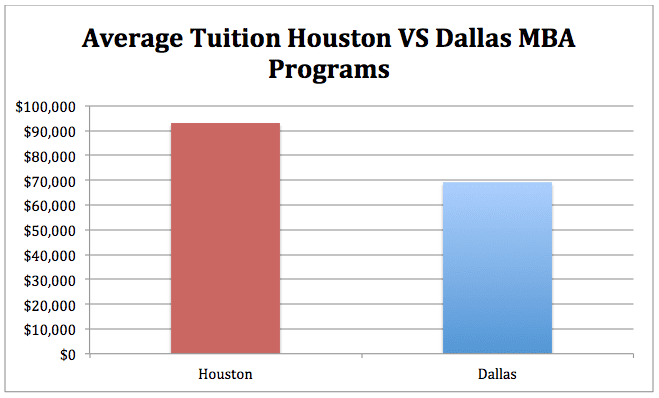
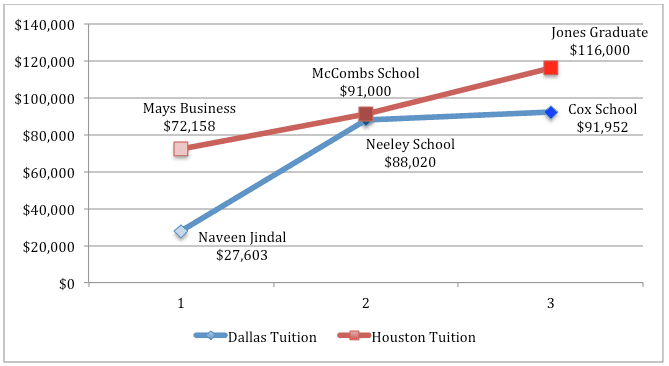
Texas MBA GMAT Averages
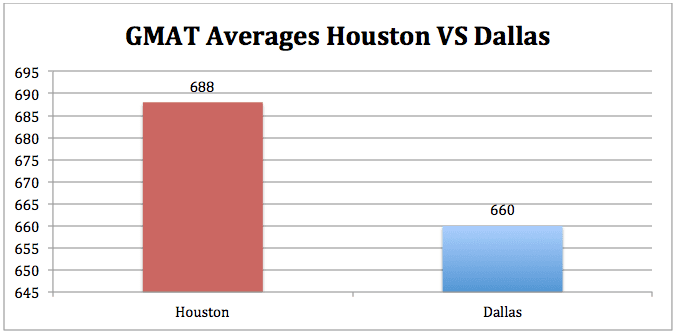
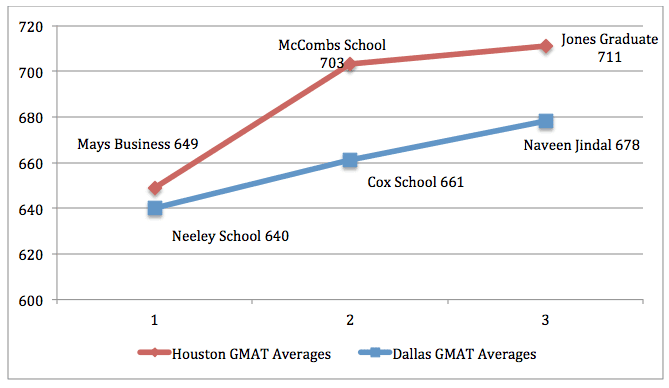
Texas MBA Post-Graduation Salaries
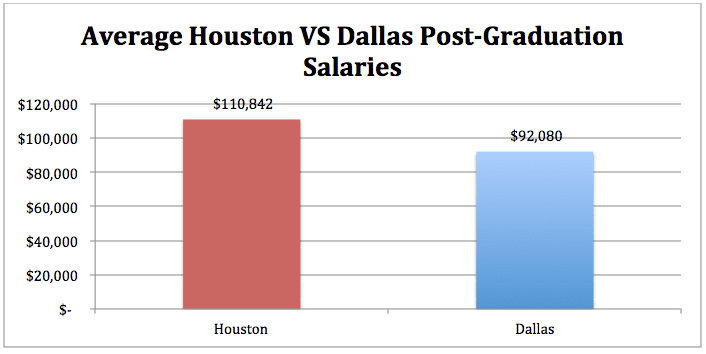
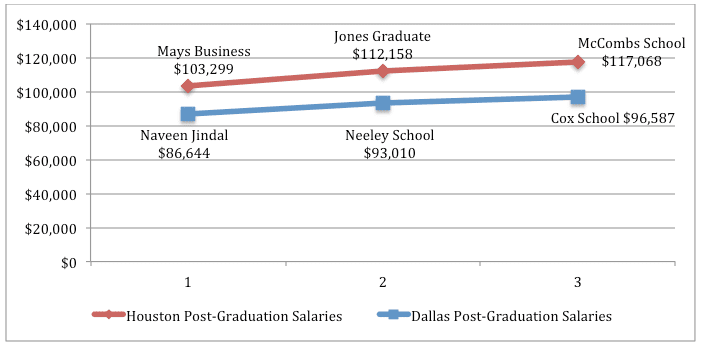
Seamless Shopping, Work Authenticity, and More – Toronto News

Professors at Toronto’s premier business schools have been making headlines this week. Let’s see what they’ve been up to.
Phasing Out the Checkout Line: Retailers Race to Make Shopping More Seamless – CBC News
Walmart’s scan-and-go shopping option, which allowed customers to scan items themselves and pay for them with a phone app, has been removed from U.S. stores. Retail expert and professor at Ryerson University’s Ted Rogers School of Management Steve Tissenbaum posited that scan-and-go was not actually more convenient for consumers, but felt it was important for businesses like Walmart to continue to innovate seamless shopping.
“They [customers] want it to be as quick and as seamless as possible when they’re ordering stuff online. Retailers certainly have to move forward. Otherwise they’ll be left behind,” Tissenbaum said in a recent CBC News piece.
The retail giant seems to agree with Tissenbaum’s view, and has launched the “check out with me” project, which will allow employees to use mobile devices to scan and charge customers for their items anywhere in the store.
You can read more about Walmart’s new project here.
How to Keep it Real at Work – Forbes
An HBR article from Wilfrid Laurier University social psychologist Vanessa Boute was recently featured in Forbes, highlighting whether employees feel authentic at work, and how this impacts their performance. Boute writes:
“One study found that the greater employees’ feelings of authenticity are, the greater their job satisfaction, engagement, and self-reported performance. We suggest, then, that the crucial point is finding a balance so that we can be true to ourselves while flourishing and finding success within the company.”
The Forbes article utilizes Boute’s findings while examining the balance between being genuine and making calculated, political moves in the workplace, and offers suggestions for leaders in the workplace to increase their authenticity. The advice included increasing transparency, truly listening to employees, being open about one’s own flaws and mistakes, and maintaining professional boundaries.
Read more about being authentic while advancing professionally here.
Choosing a Strategy for Your Startup – Harvard Business Review
The Harvard Business Review also recently interviewed Joshua Gans, professor at the University of Toronto’s Rotman School of Management, on its HBR IdeaCast. The Gans interview delved into the philosophy behind the HBR article Gans recently co-authored, “Do Entrepreneurs Need a Strategy?” Gans promoted researching strategic options before launching a startup, and choosing the strategy that best aligns with the company’s long-term goals. For example, entrepreneurs must decide whether their business will be collaborating or competing with existing businesses in the same market. Collaboration may allow a newer company to take advantage of the resources of more established businesses in the same market without being viewed as a threat, but competition leads to more autonomy for the fledgling company. The interview explored the merits and drawbacks of several entrepreneurial strategies. Gans says:
“One of the things we want to emphasize is that choice is choice. So, what we say is basically when you’ve done this process and you’ve got one or two, you know, got two or more options sitting there before you, you then go with your gut essentially, or you come up with a rationale saying why you are the right person; you feel better with one path and another.”
You can listen to the full interview with Gans here.
Starting a Franchise, Healthcare Management, and More – Los Angeles News

Let’s explore some of the most interesting stories that have come out of Los Angeles business schools this week.
So You Want to Start a Fitness Franchise? – Forbes
Katya Strombland, Los Angeles-based entrepreneur and MBA graduate of USC’s Marshall School of Business, was featured this week in an interview with Forbes. Strombland, who spent ten years working for Avery Office Products after earning her MBA, eventually found a way to combine her passion and profession—opening two Club Pilates franchises in the Los Angeles area.
The Forbes Q+A discusses how Strombland got involved with fitness franchising, and the process of investing, opening and ultimately profiting from the process. She also discusses both the rewards and challenges of franchising, as well as offering advice for those looking to get their foot in the door: “If you have the opportunity to work or volunteer at another franchisee’s location to learn the ropes from within, do it. It’s invaluable experience.”
Read more about Strombland and the process of franchising here.
Healthcare Management Students Extend Cal State LA’s Winning Streak – CBE Newsroom
A team of healthcare management students at the College of Business and Economics California State University, Los Angeles, recently placed among the top three winners at the Western Regional Healthcare Executives College Bowl Case Study Competition. The students faced off against eleven teams from graduate schools across five states to take the honor, working for more than 60 hours in three weeks to prepare.
Several of the participating students are already industry professionals, but nonetheless agreed that the competition will help shape their careers going forward. The challenge, which takes place over two rounds, requires students to develop solutions for a problem currently faced by a regional healthcare facility. Judges at the competition include all practicing C-suit executives from the healthcare management industry.
Find out more about the annual challenge and the healthcare management program at CalState LA here.
LMU Business Incubator Showcase to Spotlight Start-Up Companies – LMU Newsroom
The Loyola Marymount University College of Business Administration recently hosted its annual Business Incubator Showcase. Sponsored by the Fred Kiesner Center for Entrepreneurship, the event allows Loyola students and recent graduates to share their best business ideas with the community, while the incubator provides the necessary workspace and guidance to turn their ideas into reality.
A wide variety of business ideas were featured at the Business Incubator Showcase at the end of April, including Recupera, a meal service company for those with medical considerations, Influencer Line, which designs and markets products for influencers, and Bristl, a toothbrush that uses light therapy and sonic vibrations to boost oral healthcare.
“I am so proud of the men and women who, with the incubator’s help, have built innovative and promising businesses that are positioned for success in the marketplace,” commented Kiesner Center director David Choi.
You can read more about the business incubator here.
Top MBA Recruiters: Breaking Into Personal Care Empire L’Oreal

Considered by many as the world’s top beauty brand, L’Oreal is well known for its well-known fragrances, hair, nails, makeup, and skincare products, with a portfolio boasting legendary brands like Maybelline, Garnier, Redken, and Ralph Lauren. Headquartered in Clichy, Hauts-de-Seine, France, the company has also become a surprisingly strong top MBA recruiter. Lets take a look at what business school students need to know about the personal care empire.
Will Canadian Customers Adapt to the “Basic” Airline Standard? – Toronto News

Catch up on all the exciting Toronto business schools new from the past week below.
Air Canada, WestJet Offer Cheap Basic Economy Fares for No-Frill Seekers – CBC/Radio-Canada
CBC News sought the expertise of airline analyst and York University Schulich School of Business professor Fred Lazar for an article that examined the intricacies of “basic economy” fares. Though these fares, which offer cheaper seating and even fewer benefits than standard economy, have been popular in the United States, they have only recently been adopted by AirCanada and WestJet.
Though the thought of a cheap flight is tantalizing, basic economy definitely has its drawbacks. Passengers who take advantage of the cheap fares will not earn points (Aeroplan miles or Westjet dollars) with the airlines, cannot change their flights, are ineligible for refunds, and cannot upgrade their seats.
Though some predict the limiting and cost-effective option will see backlash from dissatisfied passengers, Lazar predicts Canadian travelers will adapt quickly to the no-frills travel option.
“Just like when [airlines] started charging for food, charging for blankets, pillows, there were complaints. You rarely get them nowadays,” Lazar said.
Learn more about Canadian airlines’ “basic economy” option here.
Why Students Make Their Ideas Commercial Faster – Forbes
This week, a Forbes article about student entrepreneurs featured a paper authored by three experts, including University of Toronto’s Rotman School of Management professor Joshua Gans. The book, “Control Versus Execution: Endogenous Appropriability and Entrepreneurial Strategy,” whose other authors include Kenny Ching of University College and Scott Stern of MIT Sloan, explored entrepreneurship in technological innovation.
The researchers looked at the successes of student-led and faculty-led entrepreneurial endeavors and found that students prioritize bringing an idea to fruition quickly, rather than obtaining intellectual property assets. Forbes used the findings in the paper to suggest that student entrepreneurs are more successful due to their emphasis on speed over caution.
“Our analysis suggests that student entrepreneurs, with less time and with less access to university intellectual property institutions, are more likely to choose an execution-oriented strategy. Compared to University faculty, who are more likely to be patient, wait for delayed market entry and pursue a control-oriented strategy with formal protection.” – Kenny Ching
Learn more about why student entrepreneurs are often successful here.
New Course Explores Intersection of Business and Community – McMaster’s Brighter World Daily News
First year students in the Integrated Business and Humanities (IBH) program at McMaster University’s Degroote School of Business have been traveling to downtown Hamilton to attend a weekly class at CityLAB. CityLAB is a hub that allows students from community institutions (McMaster University, Redeemer University College, and Mohawk College) to collaborate with municipal staff and engage with the community to tackle pressing projects and issues.

Integrated Business and Humanities meet at the CityLAB space / Photo via dailynews.mcmaster.ca
“It’s a totally new way of learning,” said IBH student Yael Morris. “We’re finding out how we can apply social innovation not just to business, but to our everyday lives so we can build relationships and interact with people in our communities.”
The class, IBH 1AD3 allows students to gain a new perspective on challenges facing their community, and to tackle these challenges from a business perspective. IBH was a collaboration between that Business and Humanities faculties aimed at producing industry leaders apt to address societal issues such as sustainability and business ethics.
“Through a combination of instruction, community-based guest speakers, field trips and projects, students have been learning about the concepts that underpin community engagement and social innovation, as well as about social enterprise and the business models used by community organizations.”
Read more about McMaster’s CityLAB course here.
Cornell’s Business Impact Symposium Returns, and More – New York News

Let’s explore some of the most interesting stories that have emerged from New York City business schools this week.
Cornell Business Impact Symposium: Bridging Sustainability and Enterprise – Johnson Business Blog
Cornell’s SC Johnson Graduate School of Management Center for Sustainable Global Enterprise hosted this year’s Cornell Business Impact Symposium (CBIS), which featured sustainability experts from the food, fashion, technology, and finance industries. Current MBA students shared their takeaways from the symposium on the Johnson Business Blog.
René Bonomi, MBA ’19, cited the “Combating Climate Change with Clean Energy Innovations” panel as a highlight, which surveyed “trends in the energy industry, such as storage improvement, and illuminating innovative start ups such as Dimensional Energy and Energy.”
Sarah Theobald, MBA ’19, was struck by the “From Fashion to Food: Excursions through Sustainable Supply Chain” panel, which “covered an array of hot topics from supply chain traceability and upcycling to the challenges of measuring social impact as well as reconciling emerging market manufacturing practices with United States corporate standards.”

Left to right; Martie Curran (Nestle Waters), Funlola Otukoya (CDP), Eileen Quigley (NRDC), Michael Van Brunt (Covanta Energy), and Jim Armstrong (Climate Changers) / Photo via johnson.cornell.edu
Read more about this year’s CBIS here.
Podcast: Mark Conrad on the Business of Sports – Gabelli Connect
The American sports industry, somehow, is becoming a bigger monolith than ever before. In fact, Forbes projects the professional sports market in the United States to grow from $60 billion to $73 billion by 2019.
Recently, Fordham University Gabelli School of Business associate professor and sports business concentration director Mark Conrad was a featured guest on a Fordham-produced podcast to discuss his organizational predictions for the NFL, Major League Baseball, and NCAA.
You can listen to the interview with Conrad below and find out more here.
A Summer Class Set in Israel – Rutgers Business School Blog
Rutgers Business School Entrepreneurship professor Gary Minkoff has spearheaded a three-week long summer course entitled Doing Business in Israel, which will “introduce students to the entrepreneurial culture and business world inside Israel,” including local Israeli aerospace, artificial intelligence, biometrics, clean technology cybersecurity, pharmaceutical engineering, robotics, and venture investment industries.
“We’re teaching entrepreneurship and innovation, so why not connect students with places where that’s happening. This course aims to plant many seeds for potential collaborations between Rutgers students and Israeli entrepreneurs and innovators,” Minkoff said.
You can learn more about the course here.
